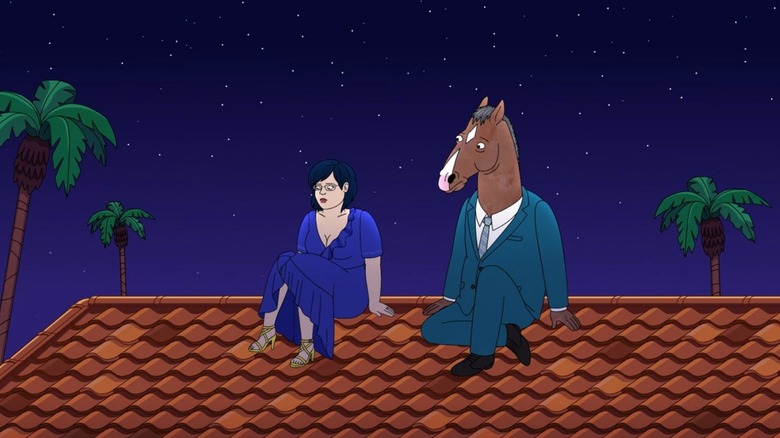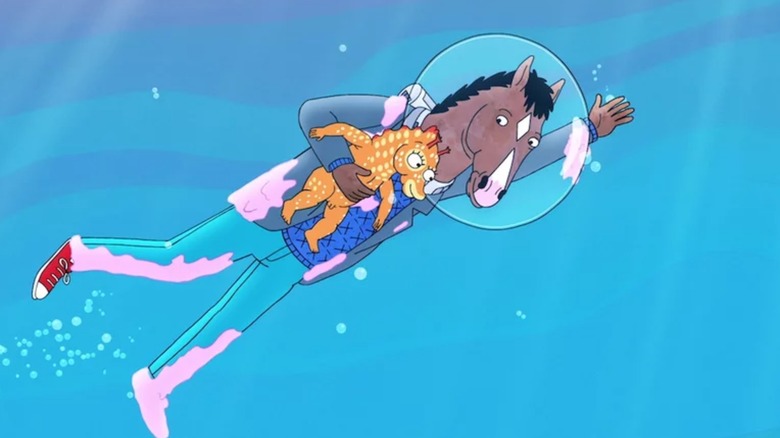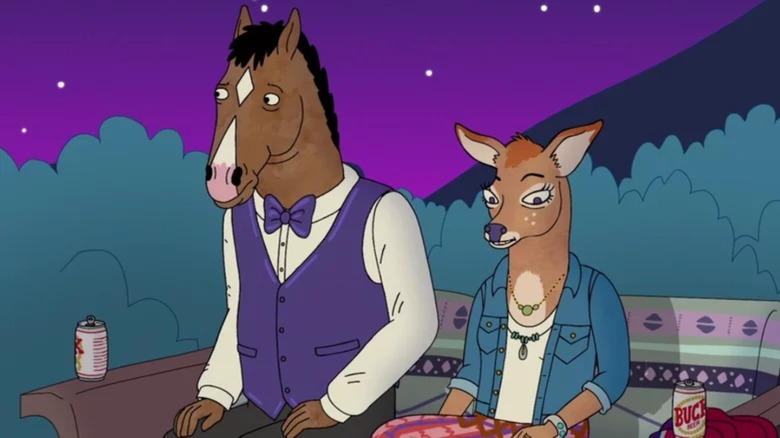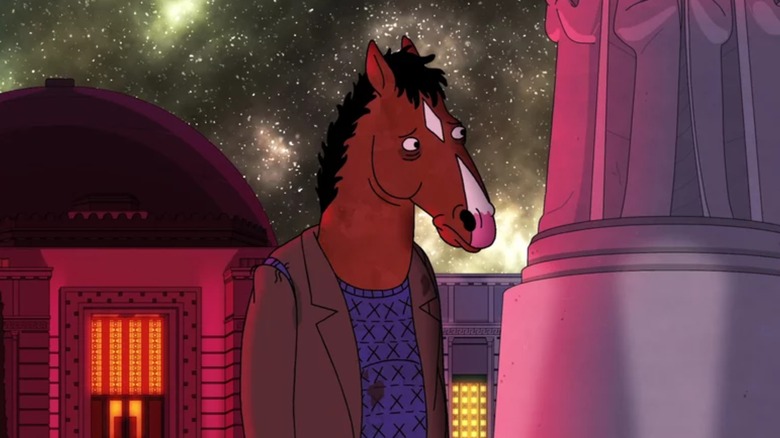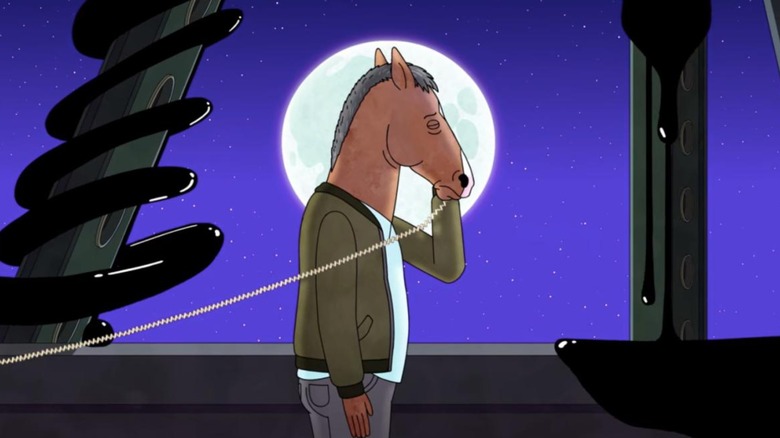A Chilling Compliment Influenced The Final Two Seasons Of Netflix's Bojack Horseman
"Bojack Horseman" is one of the best shows of all time about bad people. Its titular character, a washed-up, alcoholic celebrity horse (Will Arnett) whose solipsism knows no bounds, is written not as a flimsy caricature of a toxic celebrity, but as a beautifully, horrifyingly three-dimensional person. Bojack's many demons live uneasily alongside the better version of himself he's always so sure he's about to become. Yet as the series unfolds across six searingly satirical and deeply emotional seasons, it eventually becomes clear that no gesture or promise to change will fix everything he's chosen to break again and again.
The series asks and often answers tough questions about accountability and change. While it eventually dives deep into Bojack's traumatic family history and the psychological factors that have led to his worst bad decisions, the show never lets its humanizing elements serve as an excuse for the pain he's caused. Bad people are still people, "Bojack Horseman" seems to say, so what is life like when they have to go on living with that fact? It's an idea that, despite the plethora of antihero shows dominating the airwaves in the Aughts and 2010s, still feels radical in the hands of series creator Raphael Bob-Waksberg.
Bob-Waksberg planted narrative seeds for Bojack's full downfall early on, including one plot that saw him nearly hook up with his ex's teenage daughter, and another in which his own sitcom daughter, Sarah Lynn (Kristen Schaal), died from an overdose after joining him on a bender. But in the early seasons, "Bojack Horseman" tended to entertain the idea that its train wreck of a protagonist could actually change for good. Season 5 put that idea to bed — for good reason.
Harvey Weinstein liked a Bojack episode
Season 5 of "Bojack Horseman" was the first to air in the wake of the #MeToo movement, a worldwide reckoning with a culture of sexual abuse and harassment that became ubiquitous in the wake of Harvey Weinstein's arrest. The producer was outed as a prolific sexual abuser, but his crimes were to some degree an open secret — and he was far from the only man using his position of power to hurt women. The show, which had always shone a glaringly bright light on the seedy underbelly of the entertainment industry, responded in kind with a season that saw Bojack costar in a prestige drama alongside a Mel Gibson type, choke out his female costar in a drug-fueled haze, and end up back in rehab after reporter Diane (Alison Brie) chooses not to write a piece condemning him.
According to interviews Bob-Waksberg gave with Vice and The Huffington Post, much of this season was planned before the #MeToo movement, but an unnerving anecdote actually led the writers' room to think even more deeply about the way it handled the bad man at its core. "Someone who works with Will [Arnett] met Harvey Weinstein a year ago at a party, and he said, 'You know, I loved that underwater episode of 'BoJack' you guys did,'" Bob-Waksberg told the Huffington Post in 2018. "When I heard that story, the idea that Harvey Weinstein watched my show really gave me chills, and I thought, what is he getting out of it?"
When art might cause harm
Conversations about the responsibility that artists have for their characters and stories unfold regularly on social media, but they're often bleakly one-dimension. While some TV fans criticize shows that they see as glorifying abuse or other unforgivable actions, others are quick to snap back that "depiction doesn't equal endorsement," and there's no reason to think that the things we see on TV are the things we should be doing. While that point is true, it also tends to understate the real-life harm a work of art can cause, and Bob-Waksberg seems to have responded to the Weinstein story with a sense of culpability.
"Does he watch it and go, 'Yeah, that's right. That's the way to be. Us Hollywood guys, we're trouble. What are you going to do with us?'" he wondered aloud to HuffPo. In a conversation with Vice, he revealed that hearing about one of Hollywood's most despicable people watching and liking "Bojack" served as "a motivator for some of the conversations that happen on the show this season." The show had always couched any empathy for Bojack with a stomach-churning sense of unease over the way he was able to get so many second chances, but in season 5, that cycle finally came to a head when he committed a public act of violence. According to Bob-Waksberg, the fact that Weinstein complimented the show was difficult to process, "But thinking about that certainly led to a lot of conversations" around the fifth season.
'I'm not for censorship, but I am for being accountable'
"Bojack Horseman" never feels prescriptive, but Bob-Waksberg is open about the ways in which he saw the show's impact as a part of the process of making it. "I'm not for censorship, but I am for being accountable and really being considerate of what the stories are doing and the effects that they have," he told HuffPo, noting that the writers' room wasn't always in agreement about his theory that TV normalizes a lot of behavior it shouldn't (he uses bad boy cops as one example). That friction between the two worldviews ultimately led to an incredible work of television, one that engages on these topics rigorously and regularly, walking a fine line between a redemption story and a story about messy, complicated consequences.
After hearing about Weinstein's comment, Bob-Waksberg tells Vice he began to question the way the show was being received. "Are there people who really see themselves in BoJack in major ways?" he recalls asking, "And are they getting too much comfort from that connection?" This is a thread that's built into not just the fifth season of the series, but also the final one, in which Bojack initially seems to have reckoned with his past before the full scope of the fallout from his years of misdeeds finally becomes apparent. In the end, his ending is a realistic one: his daughter no longer speaks with him, he's been edited out of "Horsin' Around" reruns, and he served a stint in jail that left him as lonely as ever. Yet in the grand tradition of awful men, he still has a couple of people in his life who care about him despite their better judgment.
Bob-Waksberg ended Bojack with the perfect level of nuance
Typically, artists don't take responsibility for the misinterpretation of their work, and in many cases, they shouldn't have to. The recent rise in conversations about artistic culpability has garnered a lot of pushback, but as "Bojack Horseman" itself demonstrates, there's a whole lot of nuance that lies between complete absolution and complete blame. And every now and again, something happens that makes it clear that a course correction or clarification is a humbling but necessary choice. Among other examples, it happened in the '90s when Stephen King, one of the most famous authors in the world, pulled his book "Rage" from print after school shooters began using it as inspiration.
Harvey Weinstein didn't need a TV show to tell him his atrocious behavior was okay, but with the level of devastation he caused, just knowing the show might have made him feel okay about, well, anything was enough to make its writers dig deeper to fully reckon with the legacy not just of the character, but of their own work. "Bojack Horseman" ends with an exchange that feels a bit like its thesis statement. After Bojack says, "Life's a b***h and then you die, right?" Diane corrects him. "Sometimes life's a b***h then you keep living," she responds, and the brilliant thing is, that's just as true for the best people to ever watch the show as it is for the worst ones. Bob-Waksberg asked himself what people like Weinstein would get out of his show, and we might never know, but we can hope. Personally, I hope it looks something like "The View From Halfway Down."
